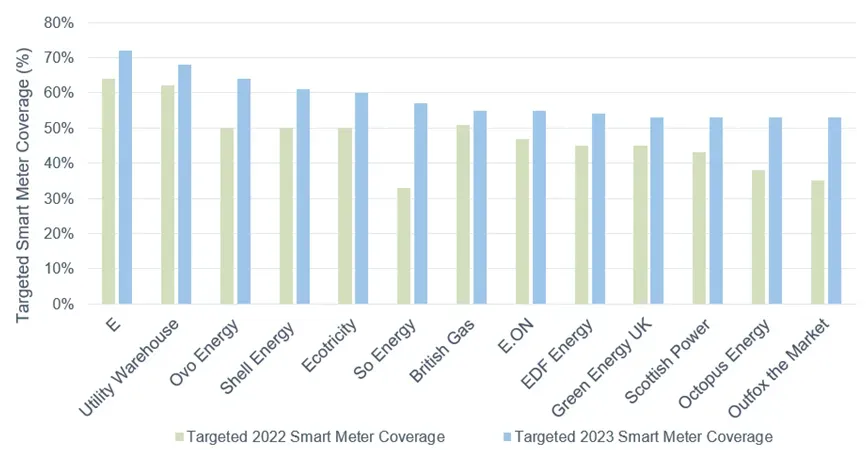"While suppliers have made progress in increasing their smart meter rollout, if they are to keep within realistic goals, they face an uphill struggle to meet the government’s 100% target."
Mikael Mahmud Consumer Markets Analyst
Data from Cornwall Insight on domestic energy supply has revealed that the government is likely to face a considerable hurdle in achieving its goal of 100% smart meter coverage by 2025. The smart meter analysis, which also looks at supplier installation figures and the annual tolerance levels1 set by BEIS, suggests that if suppliers are to be given realistic installation targets, the 100% goal is likely to be unattainable in the two-and-a-half-year timeframe.
All suppliers are expected to achieve a target coverage of over 50% by the end of 2023. E had the highest target coverage in both 2022 and 2023, with a goal of 64% and 72% respectively. However, of all the suppliers, only five had target coverages above 60% for 2023. So Energy showed a significant increase in its 2023 target coverage, rising from 33% in 2022 to 57%. OVO Energy also saw an increase in its 2023 target due to higher smart meter penetration, compared to its 2022 target coverage of 54%.
In 2022, some suppliers missed their targets as the tolerance levels set did not consider suppliers gaining customers, including those gained through the Supplier of Last Resort process. This will make reaching this year’s targets even harder.
Although it is encouraging to witness rising targets, the fact remains that GB is already halfway through the smart meter rollout and achieving the objective of 100% coverage will require a significant effort.
Figure 1: Domestic smart meter target by suppliers between 2022-23

Source: Cornwall Insight
Mikael Mahmud, Consumer Markets Analyst at Cornwall Insight:
Smart meters have been shown to decrease bills and reduce peak time energy consumption. Additionally getting to 100% coverage would be an important milestone for other industry workstreams such as market-wide half hourly settlement, helping to support flexible energy use and facilitate the transition to net zero. However, while suppliers have made progress in increasing their smart meter rollout, if they are to keep within realistic goals, they face an uphill struggle to meet the government’s 100% target.
Given the number of variables in play, from the upfront costs incurred by suppliers, through to customer willingness to install the meters, the government must weigh carefully their 100% coverage goal against the acceptable tolerance level, which allows suppliers to deviate from their targets. It’s important to acknowledge that hitting or missing installation targets may not always be within the supplier’s control.”
Reference:
1. The degree to which a supplier can deviate from the smart meter target without being deemed unacceptable.
– Ends
Notes to Editors
For more information, please contact: Verity Sinclair at v.sinclair@cornwall-insight.com
To link to our website, please use: https://www.cornwall-insight.com/
About the Cornwall Insight Group
Cornwall Insight is the pre-eminent provider of research, analysis, consulting and training to businesses and stakeholders engaged in the Australian, Great British, and Irish energy markets. To support our customers, we leverage a powerful combination of analytical capability, a detailed appreciation of regulation codes and policy frameworks, and a practical understanding of how markets function.

